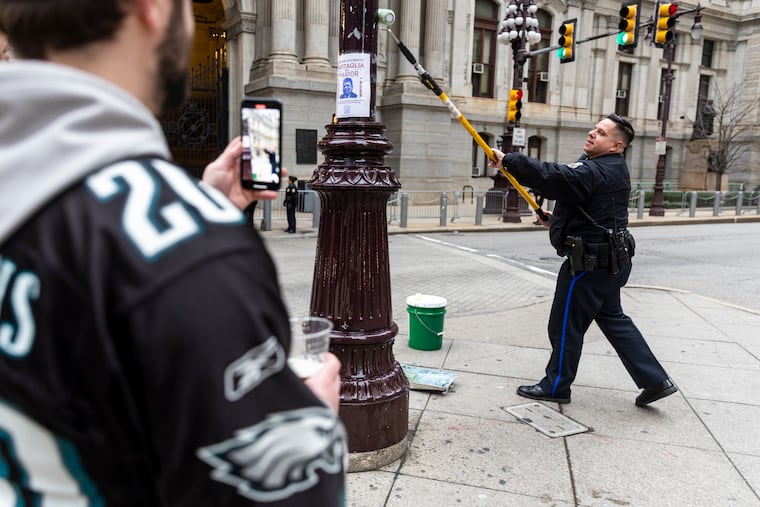Why ‘greasing’ the poles has not stopped Eagles fans from climbing
A Super Bowl for Philadelphia means that police worry about fans climbing poles. Turns out it's not so easy to prevent.

Sometime before Sunday’s Super Bowl matchup between Philadelphia and Kansas City, city workers might “grease” a select number of light poles to deter climbing by exuberant Eagles fans.
Then again, they might not. City officials have been a bit slippery with the details, and Mayor Jim Kenney has said he is “ambivalent” about the issue.
But if they use the same type of pole-greasing substance as in past celebrations, it won’t work very well, according to engineers who specialize in the science of lubrication.
The main reason? It actually isn’t grease, but a type of hydraulic fluid.
“I would call that a misapplication,” said Neil Canter, a Montgomery County-based consultant to the lubrication industry.
The product in question is Bio-Bottle Jack Hydraulic Fluid, made by Hartville, Ohio-based Renewable Lubricants. Police had some left over from the 2018 Super Bowl celebration, and applied it to poles near City Hall two weeks ago in advance of the Eagles league championship victory over the 49ers. Yet some poles were nevertheless climbed.
The product has some advantages, as it’s biodegradable and does not irritate the skin. But the bottom line, say Canter and others in his field, is that the problem of deterring pole-climbers involves a unique set of engineering challenges.
Stick with us as we glide through the unheralded science of tribology — the study of friction, wear and tear, and related interactions between moving surfaces — with an assist from Canter and University of Delaware mechanical engineering professor David L. Burris.
The problem of poles
The ideal substance to prevent pole-climbing must have a host of attributes. It must stick to metal yet not to people — either their exposed flesh or clothing. It must accomplish both of these goals despite exposure to the elements. And because poles are, by their very nature, vertical, the substance must defy gravity, Burris said.
“Even motor oil wouldn’t do well, as it would drip down the pole,” he said.
Likewise, hydraulic fluid doesn’t defy gravity terribly well, and while it can act as a lubricant, it is designed more for other purposes, Burris said.
Then there’s the problem of cleanliness of a street pole in an urban environment.
“The filth on the pole will de-wet the lubricant, which allows it to coalesce and drip down the pole,” he said.
An actual grease might work better, he and Canter agreed. While most lubricants are liquid, greases are defined as a semi-solid lubricant, typically made with thickening agents, and would be better able to withstand the pull of gravity.
But many greases used in industry are expensive.
One grease-like agent that’s fairly inexpensive is plain old vegetable shortening: Crisco. Philadelphia police tried that product on poles years ago, yet decided to move on, for reasons that were not entirely clear.
The department’s current lubricant of choice, Bio-Bottle Jack Hydraulic Fluid, is priced at $38.88 per gallon. Ben Garmier, vice president of manufacturer Renewable Lubricants, said the product was eco-friendly and causes little to no skin irritation.
“If anybody were to get crazy, it’s not going to hurt them,” he said.
Crazy? In Philadelphia? Oh Ben, if only you knew.
» READ MORE: Philadelphia ER doctors share tips for celebrating Eagles-Chiefs Super Bowl safely
To lubricate or not?
So will the poles be treated before the Super Bowl or not?
Joy Huertas, a spokesperson for the mayor’s office, provided the following statement:
“Barricades have been put into place at key locations for public safety. Additional protocols for the upcoming game are being evaluated by the police department including the greasing of poles. For public safety reasons, the city is not disclosing if/when the poles will be greased.”
She declined to elaborate. But in the past, police have said that when they make a big show of lubricating poles, fans treat it like a dare.
Canter, the lubrication industry consultant, said he does not fault city officials, as they are tackling a challenging problem with limited resources.
“They’re trying to do what they can,” he said.
As the program chair of the Philadelphia chapter of the Society of Tribologists and Lubrication Engineers, he was happy for the chance to highlight the hidden substances that keep the gears of modern society churning.
“If a lubricant doesn’t work, the planes don’t fly. The cars don’t run,” he said.
And in Philadelphia, the poles are climbed.